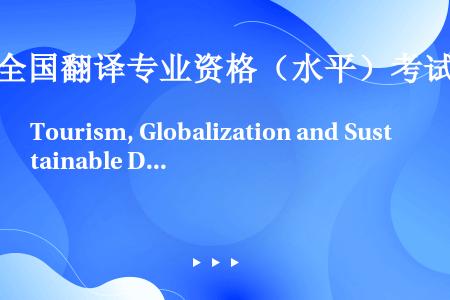 问答题
问答题
Tourism, Globalization and Sustainable Development Tourism is one of the fastest growing sectors of the global economy and developing countries are attempting to cash in on this expanding industry in an attempt to boost foreign investment and financial reserves. While conceding that the uncontrolled growth of this industry can result in serious environmental and social problems, the United Nations contends that such negative effects can be controlled and reduced. Before getting into the cold facts of global economics, let me begin with another story to warm up. I was perplexed when I recently read in the newspaper that Thailand’s forestry chief had said: “Humans can’t live in the forest because human beings aren’t animals. Unlike us, animals can adapt themselves to the wild or any environment naturally.” This was to legitimatize the government’s plan to remove hundreds of thousands of rural and hill tribe people from protected areas. This man, who is in charge of conserving the forests, is at the same time very strongly pushing to open up the country’s 81 national parks to outside investors and visitors in the name of “eco-tourism”. Can we conclude, then, that the forestry chief considers developers and tourists as animals that know how to adapt to the forest and behave in the wild naturally? While authorities want to stop the access to forest lands and natural resources of village people, another group of people—namely tourism developers and tourists with lots of money to spend—are set to gain access to the area. While authorities believe that local people, who have often lived in the area for generations, are not capable of managing and conserving their land and natural resources—under a community forestry scheme for example—they believe they themselves in cooperation with the tourist industry can properly manage and conserve “nature” under a national eco-tourism plan. Taking the above quote seriously, cynics may be tempted to say there is obviously a gap between “human rights” and “animal rights”. How is this story linked to globalization? First of all, that humans cannot live in the forest is—of course—not a Thai concept. It is a notion of Western conservation ideology—an outcome of the globalization of ideas and perceptions. Likewise, that eco-tourism under a “good management” system is beneficial to local people and nature is also a Western concept that is being globalized. In fact, Thailand’s forestry chief thinks globally and acts locally. A lesson that can be learned from this is that the slogan “Think Globally, Act Locally” that the environmental movements have promoted all the years, has not necessarily served to preserve the environment and safeguard local communities’ rights, but has been co-opted and distorted by official agencies and private industries for profit-making purposes. The tourism industry is demonstrating this all too well Many developing countries, facing debt burdens and worsening trade terms, have turned to tourism promotion in the hope that it brings foreign exchange and investment. Simultaneously, leading international agencies such as the World Bank, United Nations agencies and business organizations like the Word Travel & Tourism Council (WTTC) have been substantially involved to make tourism a truly global industry. However, tourism in developing countries is often viewed by critics as an extension of former colonial conditions because from the very beginning, it has benefited from international economic relationships that structurally favor the advanced capitalist countries in the North. Unequal trading relationships, dependence on foreign interests, and the division of labor have relegated poor countries in the South to becoming tourism recipients and affluent countries in the North to the position of tourism generators, with the latter enjoying the freedom from having to pay the price for the meanwhile well-known negative impacts in destinations.
发布日期:2021-08-11


题王网让考试变得更简单
扫码关注题王,更多免费功能准备上线!

此试题出现在
其他考试
多因素实验
在PPT中使用“开发工具”插入FLASH动画,包含以下哪些操作()
()是车站计算机联锁系统中的核心部分。
货场允许托运人、收货人以自备交通工具进出货物。()
怎样区分借代和借喻?
股权投资基金投资后阶段常用的监控指标不包括( )。
什么是管道标高?
JWJXC-7200释放值不小于()。
锻造比
关于审计抽样特征,以下描述中,恰当的有( )。
2022年度贵州翻译专业资格(水平)考试考点考场的通知
2022年度上半年翻译资格考试证书预发放公告
2020年全国翻译专业资格考试朝鲜语/韩语口译一级(交替传译)考试大纲
外语翻译资格考试CATTI国际版(中英)考试大纲
2020年全国外语翻译资格水平考试俄语海外考试准考证发放公告
2020年全国外语翻译资格水平考试CATTI国际版开考公告
2020年全国翻译专业资格考试朝鲜语/韩语笔译三级考试大纲
2022年下半年翻译专业资格(水平)考试现场人工核查安排
2022年度下半年翻译专业资格(水平)考试
2022年度上半年翻译专业资格(水平)考试补考时间及网上确认的通知
Tourism, Globalization and Sustainable Development Tourism is one of the fastes...
Globalization What exactly does globalization mean? Concepts related to globali...
Practice 2 What exactly does globalization mean? Concepts related to globalizat...
Globalization for Change in Higher Education What is globalization and how does...
_____
_____
What would happen to some countries if tourism stopped?
A tourism bureau may provide you with maps.____
A tourism bureau may provide you with maps.____
What elements of globalization can be explicitly defined using the NLS_LANG envi...

